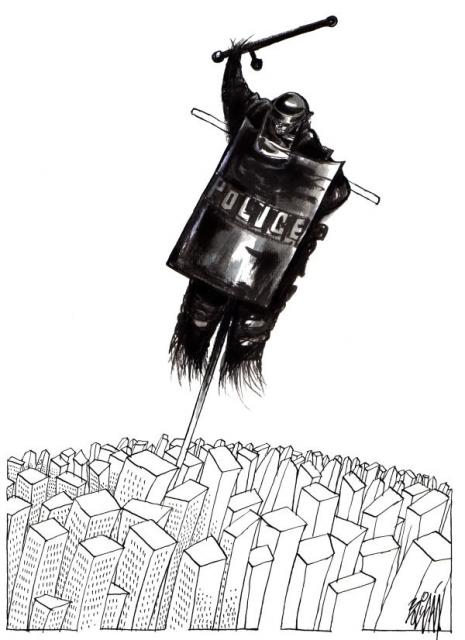Search
Democracy Links
Member's Off-site Blogs
above the law .....

Over the course of his first year in office, Barack Obama has shown himself to be a skillful and savvy politician, saying the things Americans want to hear while stealthily and inexorably moving forward the government's agenda of centralized power. For example, in one breath, Obama pays lip service to the need for greater transparency in government, while in another, he issues an executive order that will result in even more government secrecy.
He is aided in this Machiavellian mindset by a trusting populace inclined to take him at his word and a mainstream media seemingly loath to criticize him or scrutinize his actions too closely. A perfect example of this is the media's relative lack of scrutiny over Obama's recent transformation of Executive Order (EO) 12425 from a document that constitutionally limits the International Criminal Police Organization's (Interpol) activities domestically to one that establishes it as an autonomous police agency within the U.S.
Those who have voiced their concerns about this domestic empowerment of Interpol by President Obama - and that's exactly what it is - have been soundly criticized for fomenting political hysteria. But there is legitimate cause for concern. This presidential directive could undermine civil liberties and render the Fourth Amendment null and void.
In the U.S., Interpol is headquartered at the Justice Department in Washington, DC, one of the most powerful of the government agencies and the one responsible for overseeing all law enforcement within America. All law enforcement agencies that fall under the jurisdiction of the Justice Department, including the FBI and the Drug Enforcement Agency, are subject to the rigorous safeguards of the Constitution, the Bill of Rights and the laws passed by Congress.
These safeguards no longer apply to Interpol, whose records cannot be obtained through FOIA requests - which act as an important safeguard against governmental abuse - nor are they subject to investigation by other federal agencies or the courts (unless Interpol itself consents).
It's hard to know exactly what the fallout from this executive order will be, but the ramifications for the American people could be ominous. For instance, if Interpol engages in illegal and/or unconstitutional activities against American citizens, it will be impossible for U.S. citizens to obtain information - via subpoena or other commonly used legal methods - regarding its records or activities.
Additionally, any information shared by the FBI or other American intelligence agencies with Interpol could also be exempt from FOIA and Fourth Amendment protections. At this point, the rule of law breaks down completely. American intelligence and police agencies, when and if they share information, would also be above the law.
- By John Richardson at 16 Jan 2010 - 7:49pm
- John Richardson's blog
- Login or register to post comments
Recent comments
12 min 54 sec ago
26 min 52 sec ago
11 hours 12 min ago
16 hours 48 min ago
20 hours 8 min ago
21 hours 33 min ago
21 hours 45 min ago
23 hours 18 min ago
23 hours 26 min ago
1 day 14 min ago